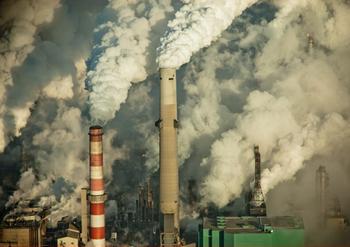
WASHINGTON, DC, December 29, 2014 (ENS) – A renewed battle over the Keystone XL tar sands pipeline is shaping up for the new year in North America.
The Republicans, who favor the Alberta-Gulf Coast pipeline because of the jobs and energy security they say it will create, will have a majority in both houses of Congress for the first time since TransCanada Corp. filed an application for the pipeline six years ago.
They plan to bring up legislation early in January to force President Barack Obama to sign the required Presidential Permit for the pipeline that declares it to be in the national interest. The Permit is needed because Keystone XL would cross an international border.

The proposed 1,179-mile (1,897 km), 36-inch-diameter pipeline would carry diluted bitumen from Hardisty, Alberta, and extend south to Steele City, Nebraska, where it would join existing pipelines to carry the dilbit to refineries on the Gulf of Mexico. The refined product is planned largely for export.
Obama says he is waiting for a lawsuit over the pipeline route in Nebraska to be settled, but has signaled that he views Keystone XL as a threat to international efforts to limit climate change.
Environmentalists on both sides of the border have made stopping the Keystone XL pipeline central to their efforts to fight climate change, and for years demonstrations have attracted thousands of people willing to be arrested in front of the White House and elsewhere across North America.
Most recently, some of the largest, most powerful environmental groups in the United States sent a memo to President Obama citing new data that shows “it would expand development of dirty tar sands oil, turbo-charging climate change by adding millions of tons of carbon pollution to the atmosphere every year.”
The memo, delivered to Obama December 18 by Oil Change International and the Natural Resources Defense Council, along with the League of Conservation Voters, the Sierra Club, 350.org, CREDO, and Bold Nebraska, analyzes current oil and transport economics and the climate impacts of the proposed pipeline on tar sands expansion.
It cites a November report from the Intergovernmental Panel on Climate Change report stating that 75 to 86 percent of the world’s fossil fuels must stay undeveloped to escape serious impacts of climate change.

Canada continues trying to build the pipeline and expand tar sands development. At recent international climate talks in Lima, Peru, Canadian government officials said they would not seek to control emissions from tar sands, even though analysts say these emissions would make it virtually impossible for Canada to reach its 2020 target for greenhouse gas reductions.
“The case is stronger than ever to reject the dangerous Keystone XL tar sands project,” said Anthony Swift, staff attorney in Natural Resources Defense Council’s international program.
“Market forces and the latest climate science make it clear Keystone XL shouldn’t be approved because it would drive up carbon pollution, making climate change worse and jeopardizing our future. It’s not a plan to help our country. It’s about big profits for big oil – and big pollution for the rest of us,” said Swift. “It’s a terrible idea, and it needs to be denied.”
But TransCanada’s president and CEO Russ Girling points out that the U.S. Department of State’s Final Supplemental Environmental Impact Statement (FSEIS) concluded that Keystone XL would create 42,000 direct and indirect jobs and $3.4 billion in U.S. GDP. Also, 17 of the 29 counties that Keystone XL moves through will see their property taxes increase by more than 10 percent.
“The regulatory process itself has been hijacked by those who believe if they can delay or prevent the Keystone XL pipeline, oil production and refining will be controlled and global GHG emissions will be reduced,” wrote Girling in November.
“This is a naïve, inaccurate and unrealistic conclusion. The Department of State’s FSEIS concluded denial of Keystone XL would not impact the amount of oil produced or refined in North America and they are right,” Girling wrote.
Still, the environmentalists’ memo warns that Canada’s tar sands industry plans a major expansion of production over the next decade.

In order to succeed profitably, the industry will need cheap transport options, high oil prices, and manageable production costs. But the environmental groups argue that things have changed since TransCanada proposed the pipeline in 2008, making profitability and environmental safety unlikely.
Oil prices have fallen sharply, the global oil market has changed, and assumptions about OPEC’s response to falling prices are proving wrong, the enviros point out. “Prices now are below the break point needed for tar sands expansion.”
The memo also argues that other proposed transport options will not work for tar sands, as predicted by conservationists. The costs and limitations of rail transportation for tar sands crude have become clearer, demonstrating that only pipelines can support the scale of the planned expansion of tar sands production.
The memo urges that “High cost, high pollution tar sands crude” must be left in the ground in order to achieve our national and international climate goal of limiting global warming to less than 2 degrees Celsius.
Together, the environmentalists say, these factors provide fresh evidence that the proposed Keystone XL tar sands project fails the “climate test” President Obama laid out last year and should be rejected.
“Because of the drop in oil price among other factors, it is now undeniable that the proposed Keystone XL tar sands pipeline will cause significant additional carbon pollution and it therefore now clearly fails the climate test that the president established at Georgetown University last year,” said Stephen Kretzmann, executive director of Oil Change International.
“The proposed Keystone XL tar sands pipeline should be the first fossil fuel project rejected explicitly on climate grounds,” said Kretzmann. “It will not be the last.”
© 2014, Environment News Service. All rights reserved. Content may be quoted only with proper attribution and a direct link to the original article. Full reproduction is prohibited.
